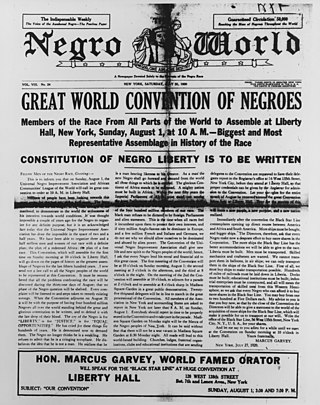Related Research Articles

Marcus Mosiah Garvey Jr. was a Jamaican political activist. He was the founder and first President-General of the Universal Negro Improvement Association and African Communities League, through which he declared himself Provisional President of Africa. Garvey was ideologically a black nationalist and Pan-Africanist, his ideas came to be known as Garveyism.

The Pan-African flag is an ethnic flag representing pan-Africanism, the African diaspora, and/or black nationalism. A tri-color flag, it consists of three equal horizontal bands of red, black, and green.

The Universal Negro Improvement Association and African Communities League (UNIA-ACL) is a black nationalist fraternal organization founded by Marcus Garvey, a Jamaican immigrant to the United States, and his then-wife Amy Ashwood Garvey. The Pan-African organization enjoyed its greatest strength in the 1920s, and was influential prior to Garvey's deportation to Jamaica in 1927. After that its prestige and influence declined, but it had a strong influence on African-American history and development. The UNIA was said to be "unquestionably, the most influential anticolonial organization in Jamaica prior to 1938," according to Honor Ford-Smith.

Garveyism is an aspect of black nationalism that refers to the economic, racial and political policies of UNIA-ACL founder Marcus Garvey.

The Black Star Line (1919−1922) was a shipping line incorporated by Marcus Garvey, the organizer of the Universal Negro Improvement Association (UNIA), and other members of the UNIA. The shipping line was created to facilitate the transportation of goods and eventually African Americans throughout the African global economy. It derived its name from the White Star Line, a line whose success Garvey felt he could duplicate. The Black Star Line became a key part of Garvey's contribution to the Back-to-Africa movement, but it was mostly unsuccessful, partly due to infiltration by FBI agents. It was only one among many businesses which the UNIA originated, such as the Universal Printing House, Negro Factories Corporation, and the widely distributed and highly successful Negro World weekly newspaper.

Negro World was the newspaper of the Marcus Garvey's Universal Negro Improvement Association and African Communities League (UNIA). Founded by Garvey and Amy Ashwood Garvey, the newspaper was published weekly in Harlem, and distributed internationally to the UNIA's chapters in more than forty countries. Distributed weekly, at its peak, the Negro World reached a circulation of 200,000.

Henrietta Vinton Davis was an elocutionist, dramatist, and impersonator. In addition to being "the premier actress of all nineteenth-century black performers on the dramatic stage", Davis was proclaimed by Marcus Garvey to be the "greatest woman of the Negro race today".
Arnold Josiah Ford was a Barbadian American spiritual leader, recognized as a pioneering figure of the Black Hebrew movement.

Amy Euphemia Jacques Garvey was a Jamaican-born journalist and activist. She was the second wife of Marcus Garvey. She was one of the pioneering female Black journalists and publishers of the 20th century.
Thomas Watson Harvey was President-General of the Universal Negro Improvement Association and African Communities League (UNIA) from 1956 to 1978.
Robert T. Lincoln Poston was an African-American newspaper editor and journalist, who was an activist in Marcus Garvey's Universal Negro Improvement Association (UNIA). He died at sea as he returned from a UNIA mission to Liberia.
The Declaration of Rights of the Negro Peoples of the World was drafted and adopted at the Convention of the Universal Negro Improvement Association held in New York City's Madison Square Garden on August 13, 1920. Marcus Garvey presided over the occasion as chairman. It was at this event where he was duly elected Provisional President of Africa.
Negro Factories Corporation was one of the business ventures of the Universal Negro Improvement Association and African Communities League recognized by 125 countries worldwide with its own Constitution and flag. The UNIA-ACL is a black nationalist fraternal organization founded in 1919 by Marcus Garvey, a North American Jamaican-born activist in New York. It eventually had chapters on three continents and in the Caribbean.

Queen Mother Moore was an African-American civil rights leader and a black nationalist who was friends with such civil rights leaders as Marcus Garvey, Nelson Mandela, Winnie Mandela, Rosa Parks, and Jesse Jackson. She was a figure in the American Civil Rights Movement and a founder of the Republic of New Afrika. Dr. Delois Blakely was her assistant for 20 years. Blakely was later enstooled in Ghana as a Nana.
Amy Ashwood Garvey was a Jamaican Pan-Africanist activist. She was a director of the Black Star Line Steamship Corporation, and along with her former husband Marcus Garvey she founded the Negro World newspaper.
Robert Athlyi Rogers, born in Anguilla, was the author of the Holy Piby, and founder of the "Afro-Athlican Constructive Church".
Carlos A. Cooks (1913-1966) was a politician from Dominican Republic.
James Robert Stewart G.S.A. Ph. was a member of the Universal Negro Improvement Association, and succeeded Marcus Garvey as President-General of the organization. He successfully relocated its headquarters to Liberia.

Maymie de Mena was an American-born activist who became one of the highest-ranking officers in the Universal Negro Improvement Association (UNIA). She has been credited with keeping the organization alive after Marcus Garvey's conviction for mail fraud and deportation from the United States.
Henry Vinton Plummer, Jr. was an American lawyer, real estate agent, civil rights activist, and black nationalist. In the 1920s he became involved in Marcus Garvey's Universal Negro Improvement Association and African Communities League (UNIA), leading the organizations publicity and propaganda wings, Garvey's secret service, and its militia.
References
- ↑ "Presentation of the Marcus Garvey Prize for Human Rights" . Retrieved April 25, 2017.
- ↑ "The "Back to Africa" Myth". UNIA-ACL website. July 14, 2005. Archived from the original on December 30, 2006. Retrieved April 1, 2007.